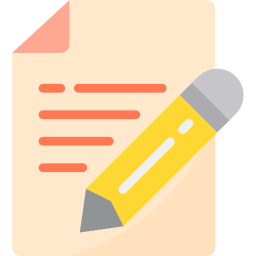b2 level test test 1
آزمون جامع لول متوسطه به بالا از سطح های ده، یازده و دوازده

با سلام،
این آزمون جامع از ترم های یکم، دوم و سوم از همه ی قسمت ها (درک مطلب، درک شنیدار، گرامر، لغت) گرفته شده است. در این آزمون علاوه بر درک مطلب، درک شنیدار، گرامر، لغت شما می بایست سوالات رایتینگ و لسنینگ را هم پاسخ دهید. با پاسخ دادن به این سوالات شما می توانید مدرک زبان دریافت کنید.
Listening:
1 What does Keith say about his company's latest project?
2 How does Keith describe his work?
3 What is the possible result of having robots that can display and detect emotions?
4 What does Keith say about robots in films?
5 Keith expresses concern that robots might cause us .....
6 Keith says that progress in the robotics industry ...
7 What does Keith say about humanoid robots?
Grammar:
1 When you arrive at the place you ……… by our men. They will take you to the exact place.
2 My little brother ……… a ticket before we went to the cinema.
3 We ……… talent shows on TV, but now, we ……… them twice a week.
4 I know the film starts at 9 pm, but I am not sure ……… it is today or tomorrow.
5 Vegetables and fruits don't taste as delicious as they ……… when I ……… a kid.
6 When Patricia ……… into her car, she remembered she ……… the water boiler on.
7 I ……… Daisy and her husband Dennis for fifteen years.
8 Farmers hope the weather ……… at the weekend because it ……… bad for weeks now.
9 The oil crisis ……… worse, and therefore, fuel prices ……… even more soon.
10 If one person is careless with a library book, then it ……… be read by others.
11 Tom, the Browns' only son, died in a terrible accident last year. Before that event, however, the family used to be very cheerful people, ………, dad?
12 If you ……… that oily meal you ……… ill.
13 After thinking about it, I decided ……… some more money with me before ……… abroad.
14
A: Is that the game ……… we played last week?
B: Yes, it is.
15 There are ……… potatoes in the cupboard, but I don't have ……… carrots, I need to buy some.
Vocabulary:
16-25 Read the sentences and write the correct word in each gap. (Be careful about dictation. Misspelling will be considered as an incorrect answer)
energizes / restriction / convenient / treatment / detergent / drown / curious / compact / permanent / combination
16 This is good for getting stains out. It makes the cloth clean.
17 She is looking for a place to stay. She doesn’t like to move house every year.
18 This book is a of fact and legend. The writer joined these to so beautifully that sometimes it makes it hard for the reader the differentiate between these two.
19 The of imports will take place next month. So there is a limitation of importing only important goods.
20 The design of the machine allows it to be stored easily. It doesn’t occupy much space.
21 Exercising me. After it, I can study for a long time.
22 It is very to pay by credit card. It is faster and easier.
23 The water of the sea caused him to . He couldn’t breathe so he died.
24 There have been great advances in the of cancer. Now doctors can cure it by a pill.
25 He was about how she would react. But I believe it can be nosiness.
26-30 Read the paragraph and complete it with an appropriate word from the list. (Be careful about dictation. Misspelling will be considered as an incorrect answer)
Patient / Get over / Fear / Filled / Chew / Dread / Operation / Make up
Several month ago, I found it really painful to my food, then I realized that I might have a bad tooth in my mouth. I called my doctor and had an appointment with him. After examining my teeth, he said one of my tooth must be extracted by and two of them need to be . I really these things, but I had no other option. I did it, and it took me one month to the pain. Now I feel better.
Reading:
Read the text and answer the questions.
Natural navigation
Max Davidson learns how to find his way using only stars, sun, trees and wind
'Take the Circle, District or Piccadilly Line to South Kensington, then walk up Exhibition Road. It will take you between 10 and 15 minutes. The Royal Geographical Society is on the junction between Exhibition Road and Kensington Gore.' The instructions are so idiot-proof that at 9 am precisely all seven of us are in our places, like expectant schoolchildren.
A man in a check suit, with a neatly trimmed beard, enters and introduces himself. 'Tristan Gooley. Welcome.' He flashes a shy smile. 'Just to put this all into context, I think I can safely say that you are the only people in the world studying this particular topic today.' It is quite an intro. There are a few oohs and ahs from the audience. Tristan Gooley, navigator extraordinary, has his audience in the palm of his hand. We are here because we are curious about how you get from A to B. And if you are curious about how to get from A to B, who better to ask than Tristan Gooley? He is the only man alive who has both flown and sailed solo across the Atlantic. You can't argue with that sort of CV.
'Natural navigation', his new baby, is exactly what that phrase suggests: route-finding that depends on interpreting natural signs - the sun, the stars, the direction of the wind, the alignment of the trees - rather than using maps, compasses or the ubiquitous satnav. 'Of course, 99.9 per cent of the time, you will have other ways of finding wherever it is you want to get to. But if you don't .. .' Gooley pauses theatrically, 'there is a lot to be said for understanding the science of navigation and direction-finding. If people become too dependent on technology, they can lose connection with nature, which is a pity.'
The natural navigator's best friend, inevitably, is the sun. We all know that it rises in the east, sets in the west and, at its zenith, is due south. But if it is, say, three in the afternoon and you are lost in the desert, how do you get your bearings? The answer, says Gooley, is to find a stick. By noting the different places where its shadow falls over a short period of time, you will quickly locate the east-west axis. 'The sun influences things even if you can't see it; he explains. You might not be in the desert, but walking along a forest track in Britain. One side of the track is darker in colour than the other. 'Ah-ha!' thinks the natural navigator. 'It is darker because it is damper, which means it is getting less sun, because it is shaded by the trees, which means that south is that way.' You can now stride confidently southwards - or in whichever direction you wish to head- without fiddling with a map.
As the day wears on, the detective work forces us to look at the world in new and unexpected ways. Just when we think we are getting the hang of it, Gooley sets us a particularly difficult task. A photograph of a house comes up on the screen. An orange sun is peeping over the horizon behind the house. There is a tree in the foreground. 'Just study the picture for a few minutes,' Gooley says, 'and tell me in which direction the photographer is pointing the camera.' Tricky. Very tricky. Is the sun rising or setting? Is the tree growing straight up or leaning to the right? Is that a star twinkling over the chimney? Are we in the northern or southern hemisphere? 'South-east,' I say firmly, having analysed the data in minute detail. 'Not quite.' 'Am I close?' 'Not really. The answer is north-west.' Ah well. Only 180 degrees out.
Still, if I am bottom of the class, I have caught the natural navigation bug. What a fascinating science, both mysterious and universal. It is hardly what you would call a practical skill: there are too many man-made aids to navigation at our disposal. But it connects us, thrillingly, to the world around us - and to those long-dead ancestors who circled the globe with nothing but stars to guide them. It reminds us what it means to be human.
1 What is the writer's main point in the first paragraph?
2 What does the writer say about Tristan Gooley in the second paragraph?
3 What does Tristan Gooley say about 'natural navigation'?
4 According to Gooley, the use of a stick which he explains ....
5 The example of walking along a forest track illustrates .....
6 What does 'it' in the phrase 'getting the hang of it' (paragraph 6) refer to?
7 What does the writer say about the task involving a photograph?
8 The writer's attitude towards natural navigation is that ....
Speaking:
1 What is your favorite movie? Talk about the plot and the casts. (You have 60 seconds to talk)
2 Describe the moment you cheated on a exam or a game.(You have 60 seconds to talk)
3 Do you like soccer? Why do you think soccer is so popular among people? (You have 60 seconds to talk)
Writing:
1 Write a paragraph or 2 about the following topic. (50 words)
(You have 8 minutes to write)
Have you or your family member been seriously injured or got sick? Describe the situation.


